Related Research Articles
In politics, a red–green alliance or red–green coalition is an alliance of "red" parties with "green" parties. The alliance is often based on common left political views, especially a shared distrust of corporate or capitalist institutions. While the "red" social-democratic parties tend to focus on the effects of capitalism on the working class, the "green" environmentalist parties tend to focus on the environmental effects of capitalism.
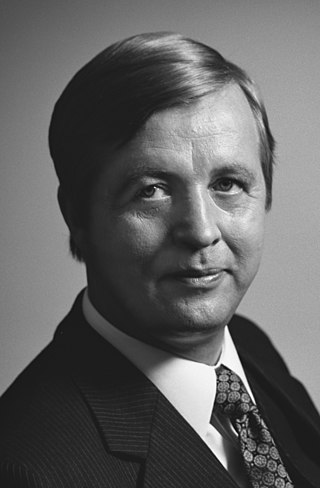
Taisto Kalevi Sorsa was a Finnish politician who served as Prime Minister of Finland three times: 1972–1975, 1977–1979 and 1982–1987. At the time of his death he still held the record for most days of incumbency as prime minister. He was also a long-time leader of the Social Democratic Party of Finland.
The National Coalition Party is a liberal-conservative political party in Finland.

The Italian Communist Party was a communist and democratic socialist political party in Italy. It was founded in Livorno as the Communist Party of Italy on 21 January 1921, when it seceded from the Italian Socialist Party (PSI), under the leadership of Amadeo Bordiga, Antonio Gramsci, and Nicola Bombacci. Outlawed during the Italian fascist regime, the party continued to operate underground and played a major role in the Italian resistance movement. The party's peaceful and national road to socialism, or the "Italian Road to Socialism", the realisation of the communist project through democracy, repudiating the use of violence and applying the Constitution of Italy in all its parts, a strategy inaugurated under Palmiro Togliatti but that some date back to Gramsci, would become the leitmotiv of the party's history.
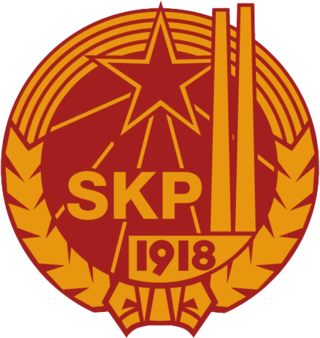
The Communist Party of Finland was a communist political party in Finland. The SKP was a section of Comintern and illegal in Finland until 1944.
A national unity government, government of national unity (GNU), or national union government is a broad coalition government consisting of all parties in the legislature, usually formed during a time of war or other national emergency. A unity government lacks opposition, or opposition parties are too small and negligible.
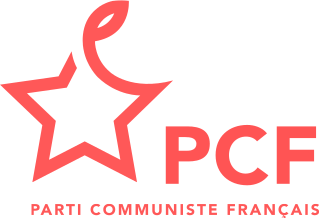
The French Communist Party is a political party in France which advocates the principles of communism. The PCF is a member of the Party of the European Left, and its MEPs sit with The Left in the European Parliament – GUE/NGL group.

The New Communist Party of Britain is an anti-revisionist Marxist–Leninist communist party in Britain. The origins of the NCP lie in the Communist Party of Great Britain from which it split in 1977. The organisation takes an anti-revisionist stance on Marxist–Leninism and is opposed to Eurocommunism. After the fall of the Soviet Union the party was one of two original British signatories to the Pyongyang Declaration in 1992. It publishes a newspaper named The New Worker.
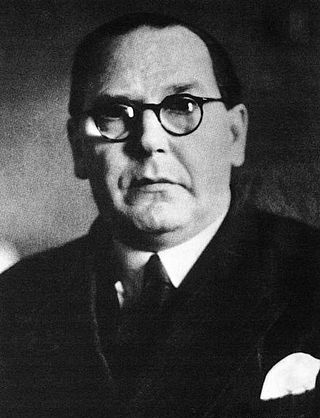
Karl-August Fagerholm was a Finnish politician. Fagerholm served as Speaker of Parliament and three times Prime Minister of Finland. Fagerholm became one of the leading politicians of the Social Democrats after the armistice in the Continuation War. As a Scandinavia-oriented Swedish-speaking Finn, he was believed to be more to the taste of the Soviet Union's leadership than his predecessor, Väinö Tanner. Fagerholm's postwar career was, however, marked by fierce opposition from both the Soviet Union and the Communist Party of Finland. He narrowly lost the presidential election to Urho Kekkonen in 1956.

Amintore Fanfani was an Italian politician and statesman, who served as 32nd prime minister of Italy for five separate terms. He was one of the best-known Italian politicians after the Second World War and a historical figure of the left-wing faction of Christian Democracy. He is also considered one of the founders of the modern Italian centre-left.

Democratic Alternative was a political party in Finland. Deva was formed in 1986 by expelled members of the Communist Party of Finland and its mass front Finnish People's Democratic League. In 1990 Deva disintegrated and its members joined the Left Alliance, a merger of SKP and SKDL, founded earlier that year.
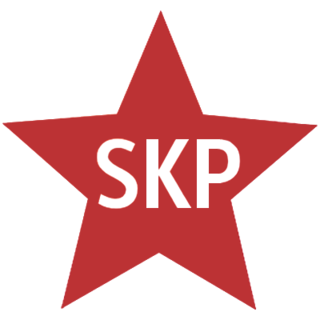
The Communist Party of Finland (Finnish: Suomen Kommunistinen Puolue, SKP; Swedish: Finlands kommunistiska parti, FKP) or New Communist Party of Finland (Finnish: Uusi Suomen Kommunistinen Puolue, USKP; Swedish: Finlands nya kommunistiska parti, FNKP) is a political party in Finland. It was founded in the mid-1980s as Communist Party of Finland (Unity) (Finnish: Suomen Kommunistinen Puolue (yhtenäisyys), SKPy; Swedish: Finlands kommunistiska parti (enhet), FKP(e)) by the former opposition of the old Communist Party of Finland (1918–1992). SKP has never been represented in the Finnish parliament, but the party has had local councillors in some municipalities, including the city councils of major cities such as Helsinki and Tampere. SKP claims 2,500 members.
Social Democratic Union of Workers and Smallholders was a political party in Finland. TPSL originated as a fraction of the Social Democratic Party of Finland, headed by Emil Skog and Aarre Simonen. Skog was the former chairman of SDP and was in dispute with the incumbent chairman, Väinö Leskinen. The party was founded in 1959, had seats in the parliament in 1959–1970 and was dissolved in 1973. It was generally identified as being politically between SDP and SKDL.

Karl-August Fagerholm's third cabinet, also known as the Night Frost Cabinet or the Night Frost Government, was the 44th government of Republic of Finland, in office from August 29, 1958 to January 13, 1959. It was a majority government. The cabinet was formed after the parliamentary election of 1958.

The Social Democratic Party of Finland is a social democratic political party in Finland. It is the third largest party in the Parliament of Finland with 43 seats.

The Socialist Party is a French centre-left and social-democratic political party. It holds pro-European views. The PS was for decades the largest party of the "French Left" and used to be one of the two major political parties in the French Fifth Republic, along with The Republicans. It replaced the earlier French Section of the Workers' International in 1969 and is currently led by First Secretary Olivier Faure. The PS is a member of the Party of European Socialists, Progressive Alliance and Socialist International.

A popular front is "any coalition of working-class and middle-class parties", including liberal and social democratic ones, "united for the defense of democratic forms" against "a presumed Fascist assault". More generally, it is "a coalition especially of leftist political parties against a common opponent".

Democratic centralism is the organisational principle of socialist states and of most communist parties. In practice, democratic centralism means that political decisions reached by voting processes are binding upon all members of the political party. It is mainly associated with Leninism, wherein the party's political vanguard of revolutionaries practice democratic centralism to select leaders and officers, determine policy, and execute it.

Arvo Aalto is a Finnish politician who headed the Communist Party between 1984 and 1988. He also served as the labour minister from 1977 to 1981.
References
- ↑ "Jouko Kajanoja". Helsingin Sanomat (in Finnish). 23 December 2012. Retrieved 13 October 2023.
- ↑ "Kajanoja, Jouko" (in Finnish). YKSA. Retrieved 26 July 2022.
- 1 2 Eric Solsten; Sandra W. Meditz, eds. (1988). "The Communist Party". Finland: A Country Study. Washington, DC: GPO for the Library of Congress. ISBN 978-1490435749.
- ↑ John Paxton, ed. (2016). The Statesman's Year-Book 1982-83 (119th ed.). London; Basingstoke: The Macmillan Press. p. 460. ISBN 978-0-230-27111-1.
- ↑ The World Factbook. Washington, DC: Central Intelligence Agency. 1984. p. 73.
- ↑ "Year 1982 in Finnish Foreign Policy". Eilen. Retrieved 26 July 2022.
- 1 2 "Finnish Party Ousts Pro-Soviet Faction". The New York Times . 6 June 1984. Retrieved 26 July 2022.
- 1 2 "Year 1987 in Finnish Foreign Policy". Eilen. Retrieved 26 July 2022.
- ↑ Jukka Paastela (1988). "The 1988 Presidential Election in Finland". Scandinavian Political Studies . 11 (2).
- ↑ "Less support than expected for Finnish president". United Press International . Helsinki. 1 February 1988. Retrieved 26 July 2022.
- ↑ "Anti-immigrant agitator Janitskin running for Finnish, EU parliament seats". YLE News . 26 February 2019. Retrieved 26 July 2022.